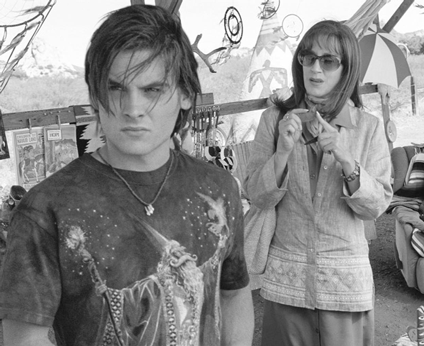Felicity Huffman is big; it’s the picture that’s small
“Transamerica,” the new film written and directed by Duncan Tucker, is terribly written, poorly conceived, and its premise is stupid to the point of ridiculousness. It is also, most likely, the best film of 2005.
“Transamerica” follows Bree Osbourne (Felicity Huffman), a biologically male pre-op transsexual living in Los Angeles, struggling to get approval for the sex change days before it is scheduled. Bree is confident as a woman, is making progress in therapy, and even holds down two jobs that both lack dignity and sophistication. The problem is she has a son, who doesn’t know her and has been arrested. Threatened with a postponement by the therapist of an operation she has waited years for, Bree embarks on bailing her son out of jail and to driving him back to Los Angeles—under the pretext that she is a Church missionary, and without letting him know his parentage or about “the land down under.”
What ensues is perhaps the most idiotic and completely conventional series of events since “Dumb and Dumber” or, more aptly, “Crash.” Tucker’s script is filled with racial stereotypes and the dialogue is as phony as Huffman’s prosthetic genitalia. Yet despite all of this, it is the most authentic cinematic experience since Jonathan Caouette’s “Tarnation” or Andrew Jarecki’s “Capturing the Friedmans.” The credit for this success lies not in Tucker’s overbearing hands, but in the more delicate fingers of Huffman.
It is important to note that Huffman, best known for her Emmy-winning role on “Desperate Housewives,” is not and has never been a man. This is made very clear in the press release, but coming out of “Transamerica,” I’m still not sure I can believe it. Her acting—impossibly—defies the script and surroundings, and manages in every moment of the film to portray a delicate and indeed, precarious balance between male and female that composes for Bree Osbourne her own personal hell. Every second of her performance is a triumph of subtlety and implication that adds new dimensions to the film. When Bree returns to her parents’ home in Arizona, her son asks her why she doesn’t live there.
“It comes with my parents,” she tells him. These words could have been used to put the burden of pathos on her mother and father, but instead Huffman puts the burden on herself despite what the film and practicality tell her to do; for Huffman’s Bree, her parents are not figures to be demonized or saved, but instead only figments of her own imagination and endemic self-hatred. In “Transamerica” Huffman proves that unlike superb performers who have defined their performance standards down for sub-optimal films, such as Robert De Niro in the “Meet The Parents” franchise, and Al Pacino in the recent “Two For The Money,” a great actor does not require a great film to make her performance; rather it is in her performance the film becomes great. It is safe to say that this acting job is the best by an American actress since Hilary Swank in “Boys Don’t Cry.” Her subtle facial expressions and the impossible brilliance of her voice makes Charlize Theron’s heavily made-up serial killer Aileen Wuormos in “Monster” look like Natalie Portman’s Princess Amadala in comparison.
This is not to say that Huffman is completely alone. Her son is capably played by Kevin Zegers, who does an impersonation of sorts of an omni-sexual Leonardo DiCaprio, and in a cameo appearance, Graham Greene pulls a sort of mini-Huffman in his own transformation from a heavily-stereotyped role into a realistic one. The film also has the benefit of being wonderfully shot by cinematographer Stephen Kazmierski, who makes both the streets of downtown New York and the Arizona desert beautiful in a way even the Academy might appreciate. Given Huffman’s feat, that’s sure not to be the only thing given their deep consideration.
gaycitynews.com


































